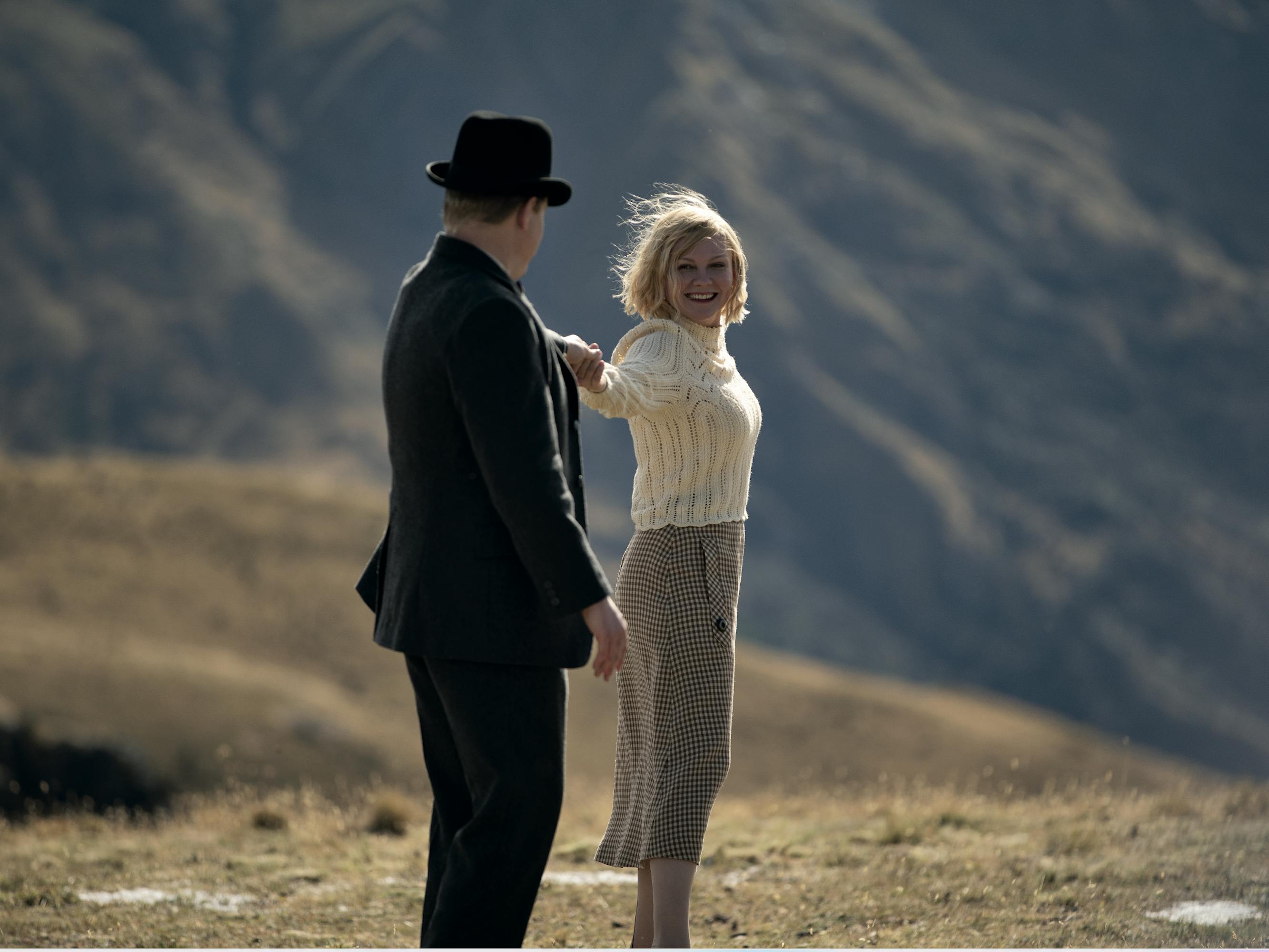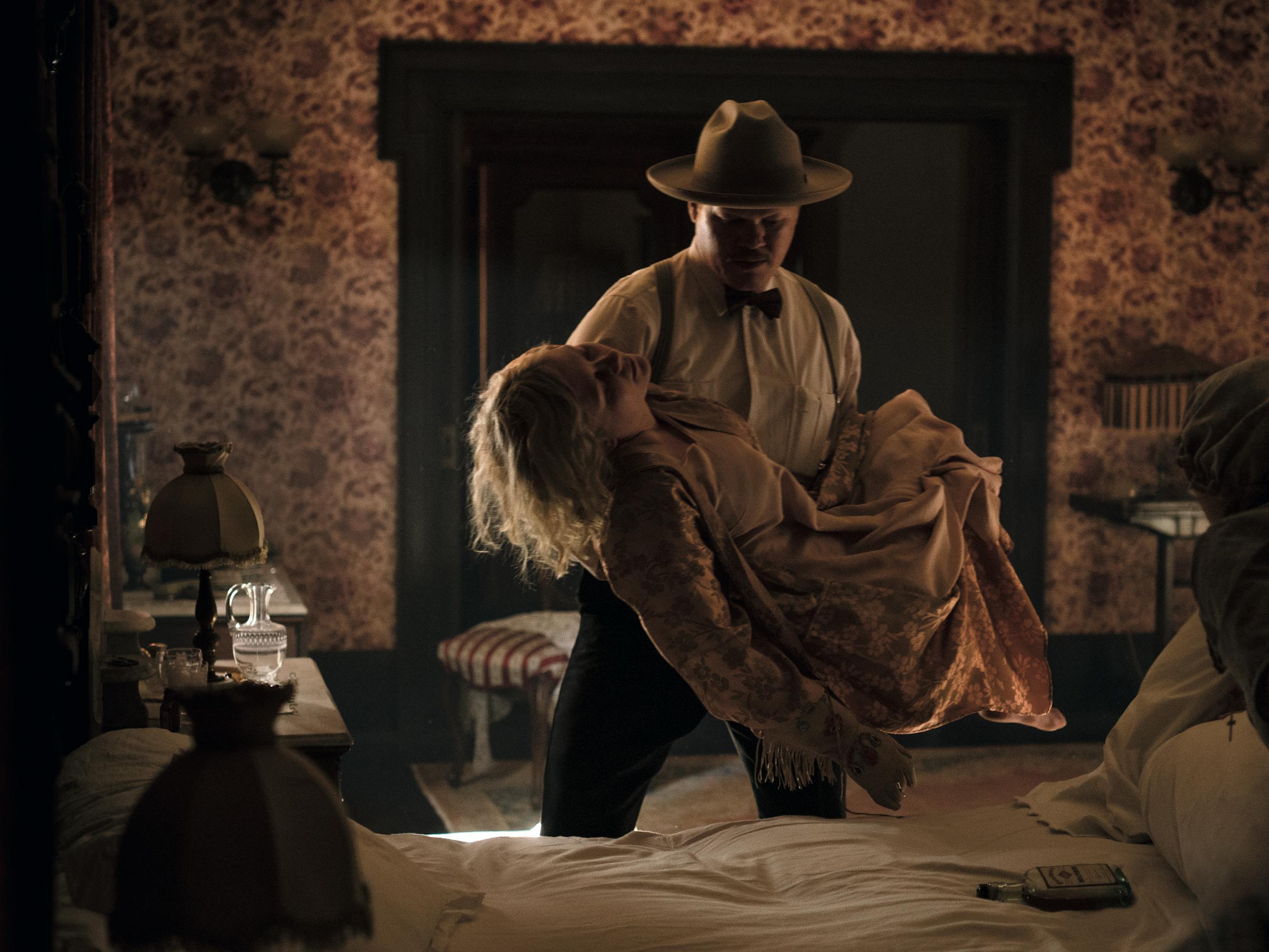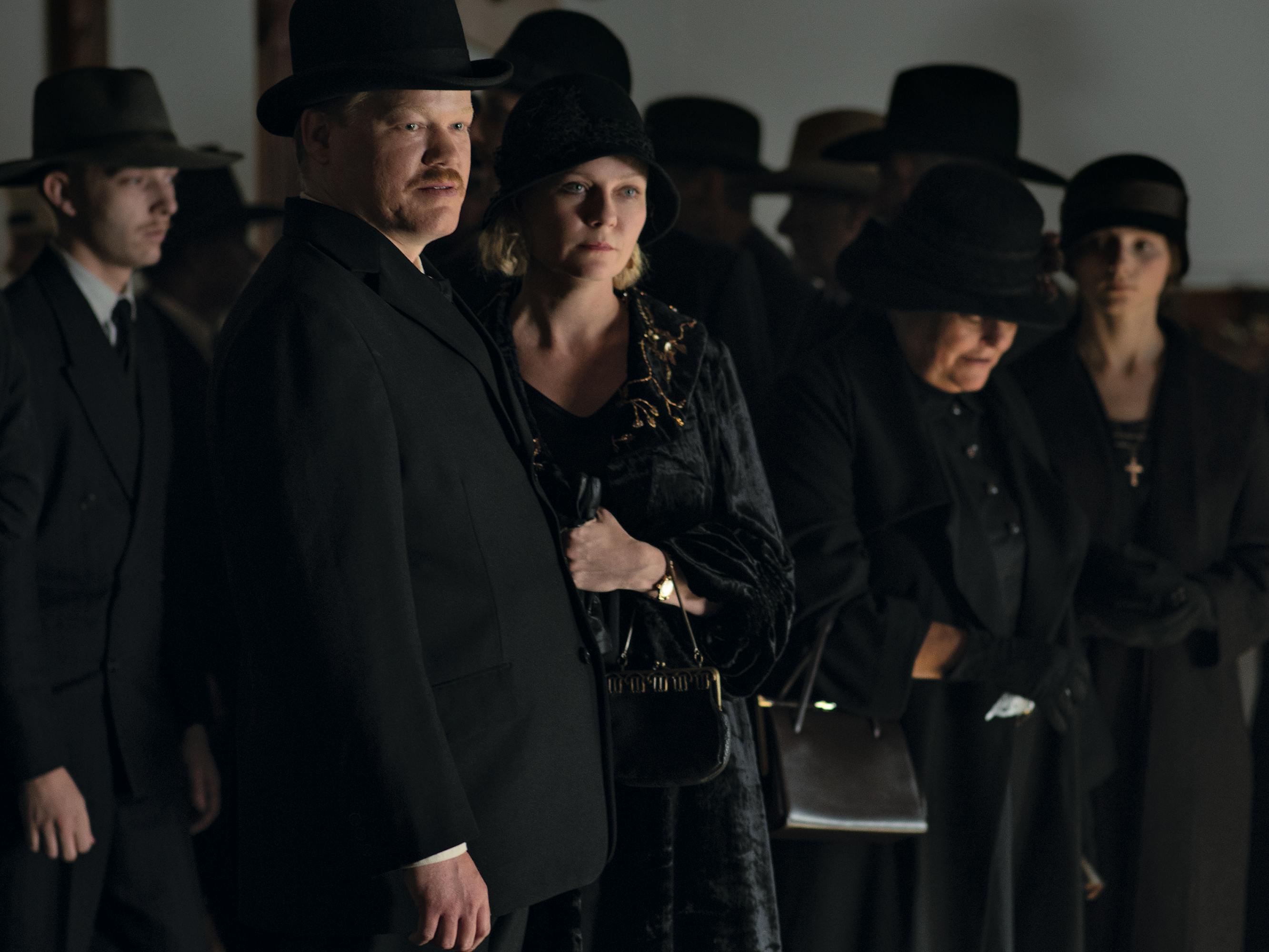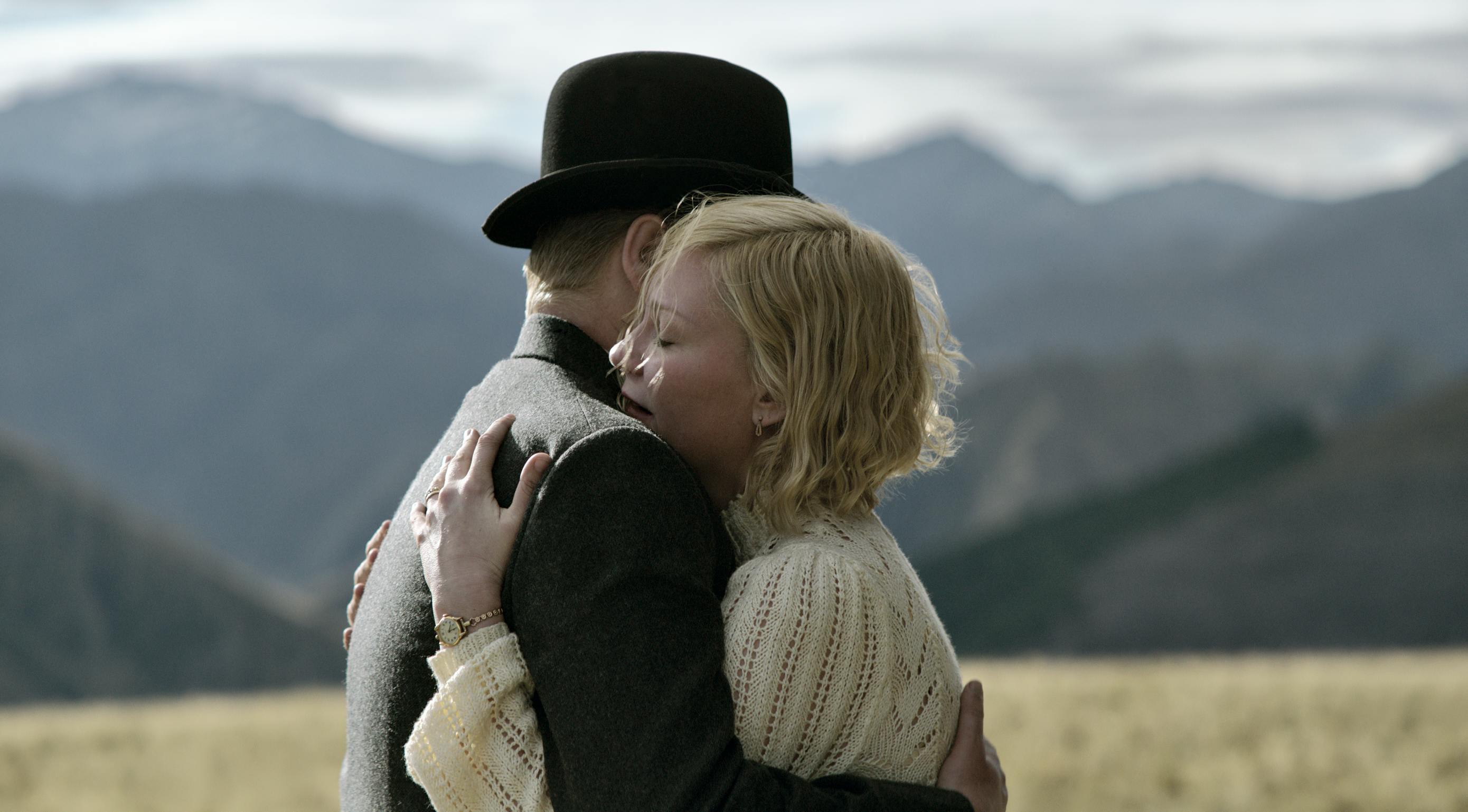The iconic couple takes their turn in Jane Campion's The Power of the Dog, earning their first Oscar nominations along the way.
In one of the most moving sequences of Jane Campion’s haunting frontier drama The Power of the Dog, sweet-natured widow Rose Gordon takes the hand of her fiancé George Burbank and begins to teach him to waltz against a breathtaking backdrop of mountainous Montana country. As they practice their steps together, George soon finds himself overcome with emotion. Breaking away from Rose, he takes a moment to compose himself, gazing out at the blue sky that stretches endlessly away into the distance. When she calls out to him, asking, “What is it, George?” He turns back to her and replies, “I just want to say how nice it is not to be alone.”
It’s a testament to the fully realized performances of stars Kirsten Dunst and Jesse Plemons that the heartbreaking moment lands with the force of a gut-punch. By the time they arrive on that mountain, George and Rose both have come to know profound loneliness — it’s a dominant, suffocating presence in their lives. You can see it in the way they hold themselves, the longing in their eyes. But it’s also clear what the two characters have come to mean to one another in only a short expanse of time. After years of hardship and suffering, Rose and George’s tender romance offers them both a chance at real happiness — it’s a lifeline for two people, lost and adrift, who had given up hope of ever being rescued from a sea of workaday despair.
For their remarkable supporting work in the acclaimed film, Dunst and Plemons earned their first Academy Award nominations, the capstone on careers that have seen both performers grow from child actors into widely respected industry veterans known for their versatility and presence. They’ve also become this awards season’s most celebrated power couple, as the pair, who are engaged, are the parents to two young sons. “He’s my best friend,” Dunst told Queue last year. “At the end of the day, to have somebody who really has your back so hard [has] meant everything.”

Jesse Plemons and Kirsten Dunst
As individuals, the two actors have built enviable résumés in film and television, working in every genre imaginable. Dunst enjoyed breakout Hollywood success at the age of 12, starring in three of 1994 and 1995’s biggest films — Interview with the Vampire, Little Women, and Jumanji — though her first serious taste of critical acclaim came in 1999 with her starring turn in Sofia Coppola’s directorial debut The Virgin Suicides. She took comedic turns in such films as Drop Dead Gorgeous and Bring It On followed, before originating the live-action role as Peter Parker’s leading lady Mary Jane Watson in Sam Raimi’s blockbuster Spider-Man trilogy.
In 2004, Dunst’s turn as a young receptionist infatuated with her much older boss in the Michel Gondry-Charlie Kaufman collaboration Eternal Sunshine of the Spotless Mind signaled her interest in tackling increasingly challenging material. Indeed, as she matured, Dunst made a point to not only continue her professional relationship with Coppola, starring in the filmmaker’s royal fantasia Marie Antoinette, but also partner with many other revered filmmakers — Lars von Trier on the apocalyptic Melancholia, Leslye Headland on her debut black comedy Bachelorette, Jeff Nichols on the sci-fi inflected drama Midnight Special, among them. “I feel like a lot of the things I do, people appreciate after the fact,” Dunst told Queue. “Someone came up to me yesterday and was like, ‘We just watched Marie Antoinette. We loved it.’”
Like Dunst, Plemons began acting as a child, before making his way into audiences’ hearts with his lovable portrayal of Landry Clarke on Friday Night Lights. Subsequently, he became highly sought-after, quickly amassing a series of impressive credits in film and television — Breaking Bad, The Master, Bridge of Spies, Vice, The Irishman, I’m Thinking of Ending Things, Judas and the Black Messiah — and working with the likes of Steven Spielberg, Martin Scorsese, and Paul Thomas Anderson.
“This constant push and pull between the preparation, making sure you know the character, but then the willingness to sink into the moment and not get stuck in something intellectual — always what I’m most excited by are these found moments that come out of putting together all these brilliant people,” Plemons says.
He and Dunst met on the set of the second season of writer-director Noah Hawley’s anthology series Fargo — the actors were cast as Ed and Peggy Blumquist, a blue-collar Minnesota couple drawn into dark dealings in their small town, and found an immediate professional rapport.

Jesse Plemons and Kirsten Dunst
“We trusted each other very quickly — that’s something that’s hard to come by,” Plemons told Queue. “Some of that’s intangible and hard to explain — why you work well with certain people or why it’s easier with certain people. It’s just like why in life you become fast friends with someone or feel like you know them quickly. We had that on Fargo, and for whatever reason, we’re able to be really honest with each other.”
Fargo earned both Dunst and Plemons their first Emmy nominations in 2016 — Plemons received his second two years later for his turn as a disgruntled video game programmer in the 2017 Black Mirror episode “U.S.S. Callister.” Although the pair hadn’t necessarily planned to work opposite one another again, fate brought them together in The Power of the Dog, Campion’s adaptation of Thomas Savage’s 1920s-set novel.
When the project came first to Plemons, the Texas native was excited by the idea of working in the Western milieu, but he initially worried that scheduling conflicts would preclude him from accepting the role of George. Then Dunst stepped in: “Kirsten was like, ‘It’s Jane Campion. You’re doing this.’” It was only later that she was cast as George’s romantic counterpoint, Rose, the proprietor of the Red Mill Restaurant, which she operates to support herself and her adolescent son, Peter (Kodi Smit-McPhee), who dreams of becoming a surgeon.
Downtrodden George arrives at the Red Mill in the company of his cruel and manipulative older brother, Phil (Benedict Cumberbatch), who has spent a lifetime belittling his kindly sibling. As they sit down to a meal, Phil turns that same vitriol toward the sensitive Peter, driving both the boy and his mother to tears. After George returns to the Red Mill later to apologize for Phil’s behavior, he and Rose embark on a tentative courtship. “With George and Rose, you’re seeing a lot of it [develop] in real time, so there isn’t that history,” Plemons told Queue. “There was less to create and more just on the spot, giving into the moment.”
Once the pair marry and Rose and Peter come to live with George on the Burbank family ranch, it’s only a matter of time before Phil’s barbs undermine Rose’s confidence. When George is called away on business, his new bride dissolves under Phil’s unflinching gaze, eventually descending into alcoholism. Dunst charts her psychological breakdown before our eyes.

Jesse Plemons and Kirsten Dunst
Faced with such creatively demanding roles, Dunst and Plemons were grateful to be able to turn to one another on the film’s New Zealand set. Dunst says it was truly ideal “to be able to work with Jesse again, and on a Jane Campion movie. We could have lunch together on set and just be supportive; we could nap in our trailer. We were a good two-for-one deal, I think, for production.” Adds Plemons: “It was the best of all possible worlds getting to not only work together again, but on a Jane Campion film in New Zealand and bringing our two-year-old son along.”
Ever since The Power of the Dog premiered to near-universal acclaim at the 2021 Venice Film Festival, critics have hailed the mastery of Campion’s filmmaking as well as the virtuoso performances of the drama’s stars who together transform the narrative into a devastating portrait of love and loss, obsession and retribution in the American west. “Its most striking landscapes may be the faces of its four extraordinary actors,” wrote Justin Chang in the Los Angeles Times.
“The camera lingers on the the mix of decency and helplessness in Plemons’s softer visage, which here hides almost nothing,” Chang continued. “Dunst, meanwhile, twists her countenance into a mask of pain and desolation as Rose shrinks under the weight of Phil’s serial humiliations.”
Although Dunst and Plemons empathically bring to life the fresh wounds Rose and George sustain over the course of the drama, their suffering isn’t endless — indeed, Campion offers their characters something resembling a happy ending. When The Power of the Dog concludes, Phil is no longer a threat to their future, leaving the couple a chance to forge a new path — maybe even one that will take them back to the mountaintop, where they can dance together beneath the clouds, as though they are the only two people in the world.
